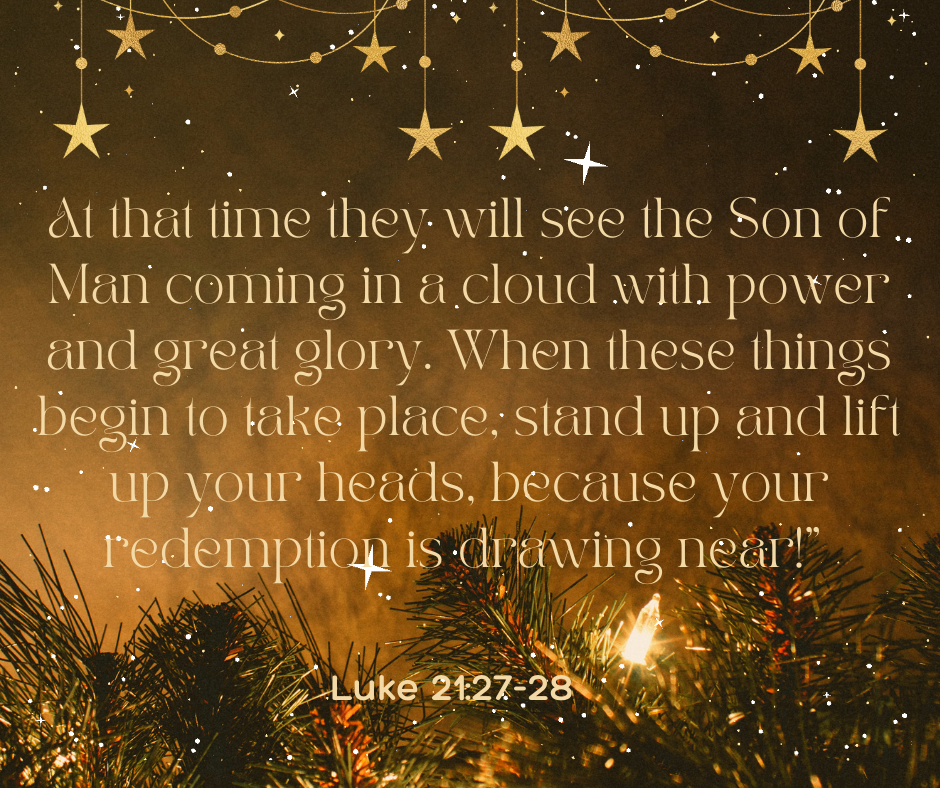There was also a prophetess named Anna, the daughter of Phanuel, of the tribe of Asher, who was well along in years. She had been married for seven years, and then was a widow to the age of eighty-four. She never left the temple, but worshiped night and day, fasting and praying. Coming forward at that moment, she gave thanks to God and spoke about the Child to all who were waiting for the redemption of Jerusalem. Luke 2:36-38 “Daddy’s home!” the high-pitched, jubilant cry of my little sister rent through the air of our larger, middle-class home. Pulling her nose and hands off the panes of the bay window overlooking our driveway, her cry was echoed by less than jubilation. The repeated phrase bore more the sound of a panic-stricken, pubescent middle-school boy. While the fun began with the advent of my father, so did the ensuing scramble of “pick-up time.” It was a time that Mom had tried to instill in us, and was supposed to initiate at 4pm so that my dad could come home to a clean house, a warm dinner, and an excited family waiting to welcome him, grateful for the long hours he had put in at the office. Quite honestly, it was a time that rarely began until we heard the familiar sound of his car in the driveway. Beth reached as high as she could with her chubby fingers and swung the door open toward herself, backing up with it until the opening was wide enough to run through. She rushed out to greet him, heedless of the door standing open, the cold air springing to take advantage of osmosis, or the rush of adrenaline and activity behind her to make preparations. Legs and duplos must we swept off the floor, laundry and toys on the stairs taken up to the rooms, schoolbooks stuffed haphazardly into shelves, sometimes never to be found again, and a multitude of small items that no one knew where they belonged and would find their home in any stray crack or cranny, couch cushion or basket. If the item was too large, it would find its way to the basement ping-pong table, which was conveniently large enough to hold a massive amount of confused items. It is not always beneficial when kids are “helping” to clean, after all. The fun would begin when Dad was home and all the boring work of the day was over. Perhaps he would play games with us, hide and seek in the dark, cards, or wrestle in a tickle battle on the floor. Surely he would read us a missionary story and a chapter from a fiction novel, using all the right voices and sound effects. Undoubtedly, he would pick out his stack of books to read and try to eat his cheerios in peace before bed. That was my favorite time. When everyone was else was gone, it was my turn to find any questions I could come up with to spark a conversation and gain one-on-one attention. My mom used to say that she loved it when Dad would come home, because he would chase the demons away. All the frustration of dealing with us, all the mess and the work, the bad attitudes and the arguments—Dad would come home and make it all better. Every day we waited. Every day we listened for the sounds that meant life would be great again. I imagine that in a very small way, this is a bit of the expectancy of the time in which Anna lived. While our difficulties were vastly more bearable with the love we experienced in our family, the darkness of the oppression that Anna lived under with the Roman occupation and extreme abuse of her rights she likely suffered because of her gender, her social status and her ethnicity would have greatly intensified the longing she and her fellow Israelites would have felt for the coming Redeemer. Here we see a repeat of a name that we may be familiar with from the Old Testament—that of Hannah, the mother of Samuel. In Hebrew, her name is “Channah,” and in Greek it is “Anna.” Her name means to be favored by grace. A more literal picture of the Hebrew word is that of a benefactor leaning toward someone who is coming with a humble request in order to bless and give to them their needs. Anna’s name is meant to bring to mind the story of her namesake, Hannah, in 1 Samuel 1, who was bereft of children. In her grief, she fasted, prayed, and shed tears with loud groanings “to the one who could rescue” her in her situation, and she “was heard because of her obedience (Heb. 5:7).” Asking for a child, she vowed to dedicated him for a lifetime service as a Nazirite if the Lord would hear her request. Together with her husband, Elkanah, “God is Redeemer,” they kept their vow and dedicated their young son, Samuel, “Heard of God,” for a lifetime of Nazir, or sacred and set apart service to the Lord. Luke tells us that Anna was the daughter of Phanuel, and does not list her husband. Phanuel’s (Peniel) name means “the face of God,” and is meant to bring to mind the story of Jacob wrestling all night with the angel of the Lord in order to blessed by God. At daybreak, Jacob is blessed and given a new name. Realizing at once that he had in fact been wrestling with the Lord Himself, Jacob “called the place Peniel, saying, “It is because I saw God face to face, and yet my life was spared. The sun rose above him as he passed Peniel....(Gen. 32:30-31).” Anna came from the tribe of Asher, which means “happy/blessed,” and “level/straight,” which refers us back to the story of Leah and her wrestling (Gen. 30:8) with her sister for her husband’s love and the favor of God. After giving birth to Asher, Leah named him “happy” or “blessed” because she believed that her happiness would be guaranteed now because she had been given children. Luke informs us further that Anna was “χήρα,” which is to be bereft, sterile, barren, or stripped of inhabitants or riches. While she was a widow in our common vernacular, this word was also used of those who had no provision or protection for themselves, but relied solely on God’s provision for them. It also included women who were single and without family support, or those who had been set apart under a Nazir vow and were, therefore, bereft and dependent upon God for their needs (Ex. 38:8, 1 Sam 2:22). Anna very well may also have served in the same capacity as a ministering woman at the tent of meeting, which likely included Nazirites as well as Kohathite Levitical women serving and ministering (Ezra 2:65-70, Neh. 7:66-73, 1 Chron. 25:5-6). This group of ministering women would have depicted an early form of what would later become the ministering women serving in the church in the order of the “χήρα,” mentioned in Acts 6 and 1 Timothy 5 with its lists of qualifications that rival that of the presbyteroi just mentioned in the book, as well as concluding with the payment given to them, or to those ministering in the word of God, that of double payment. Acts 6 men who were appointed to be sure to wait on tables were likely given the responsibility of administering the payments of currency to these ministering women, since the word for table also carried the idea of banking, and since the Hebraic law and current culture of the day dictated that those who served were to be paid daily. Anna was married for seven years, the Biblical number of completeness. Since she was married a complete amount of time, one would assume that it was surely enough time to have had children of her own. The text, however, shares nothing with us of any children, but rather of her day and night living and ministering in the temple. This indicates that she was childless—bereft in more ways than one. Though the Luke’s account in chapters 1 and 2 show us two other bereft and childless women whom God impossibly blesses with children, one in her old age (Elizabeth) and the other in her youthful virginity (Mary), Anna, whose name would have constantly reminded her of her own hope for children, remained childless. Additionally, being bereft of children after her husband’s death likely would have qualified her for the Levirate law (Deut. 25:5-10), where her deceased spouse’s brother would have been required to redeem her monetarily and then taken her and raised up children for her husband by her. This would ensure that both the widow and the deceased husband would maintain a portion in the land of the Promise. Their name would not be cut off from their people. We find an example of this law as Boaz acted in this capacity as a kinsman-redeemer in the story of Ruth. If Anna had consented to this Levirate arrangement, she would not have remained a widow or bereft, and it may be that though that was available, she instead devoted herself as a Nazirite to wait for her redemption from God, instead. We must prepare the way for our Redeemer!  Anna must have thought of the children her namesake had asked for and been given by God. Hannah was “heard of God.” No doubt Anna’s own lifestyle of fasting and prayer included not a few tears for her own lack. She may not have felt “heard,” and given the fact that she remained single until old age, she likely had no more hope for being “heard of God” in this capacity. So where was God’s favor? Where was His grace on her life? Without children and as a widow, she would have been presumed by others to be cursed for sin of which perhaps only God knew. And yet Luke makes it plain that she is a godly woman, ministering in the same way we see the apostles “ministering before the Lord” in Acts 13:2 in a liturgical sense. However, just as her predecessor Hannah did not drown herself in sinful pleasures or addictions, but rather poured out her soul in faithful service and ministry to the Lord, we see Anna so doing. We don’t see her remain idle in her sorrow. Instead, we see her invest in others and allow herself to be so filled with God that she regularly prophesied. We see her dedicating herself to the ministry, and spending her days and nights fasting and praying and proclaiming God’s Word. It is highly likely that the very people to whom she had prophesied regularly were many of the very ones whose hearts were waiting expectantly for the “redemption” to come. Just as her descendance from Asher suggests, we see her “preparing the way for the Lord, and making “straight paths for Him. We may find ourselves in a situation similar to Anna. Do you find a lack somewhere, a bereftness? A removal or stripping of your resources? Does this cause you pain and grief? What do we do when our resources are removed? Do we spend our energies out in self-pity, “look anxiously about” us, or desperately search for ourselves the resources we think we must have in order to find ourselves rescued? Or do we start waiting upon the Lord as his servants, with praise, worship, fasting and prophesying the divine message of expectancy to a dark and waiting world? We must wait expectantly on the Lord!  Familiar with her own need and lack of a redeemer for her bereft state, attuned and practiced to the voice of the Holy Spirit, Anna was ready to recognize the Redeemer when she saw Him through the power of the Holy Spirit. Anna knew that God gives his people a more lasting portion eternally, and she was happy to trade physical redemption for spiritual redemption by her Redeemer. In the midst of Anna’s day-to-day service, she experienced a favor far greater than that for which she may have longed—that of seeing the face of her God and living to tell of it! While this was true of Anna, it is also true of us. As we go about our daily ministry in our homes, our churches and our communities and most especially in our day and night ministry to the Lord Himself, He meets us in our day-to-day with His Living Presence. As we practice listening to the voice of the Spirit and walking in obedience, we become more and more attuned to the words that direct us into the situations He wants to use to bring us favor: Yet the Lord longs to be gracious to you; therefore, he will rise up to show you compassion. For the Lord is a God of justice. Blessed are all who wait for him! People of Zion, who live in Jerusalem, you will weep no more. How gracious he will be when you cry for help! As soon as he hears, he will answer you. Although the Lord gives you the bread of adversity and the water of affliction, your teachers will be hidden no more; with your own eyes you will see them. Whether you turn to the right or to the left, your ears will hear a voice behind you, saying, “This is the way; walk in it.” Isaiah 30:18-21 |
AuthorHalley Faville lives with her husband and children in their mountain home in Oregon. Archives
May 2024
Categories
All
|









 RSS Feed
RSS Feed